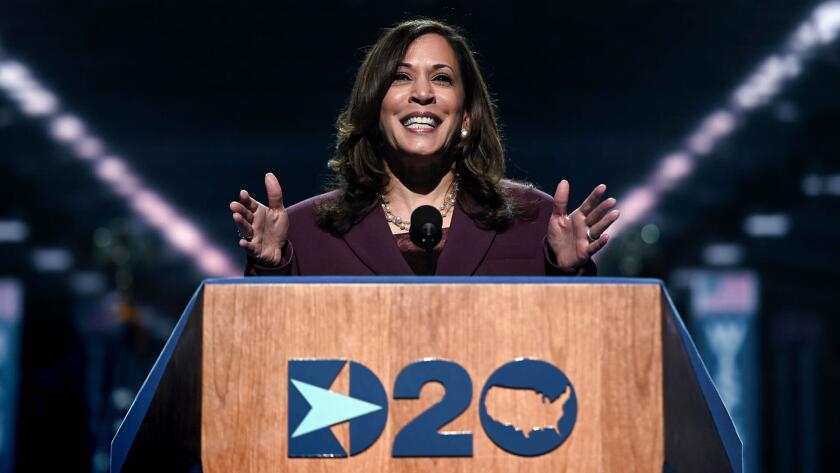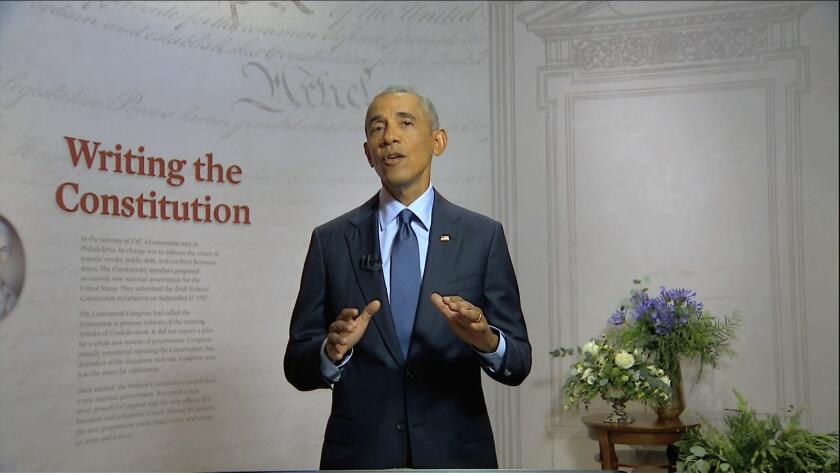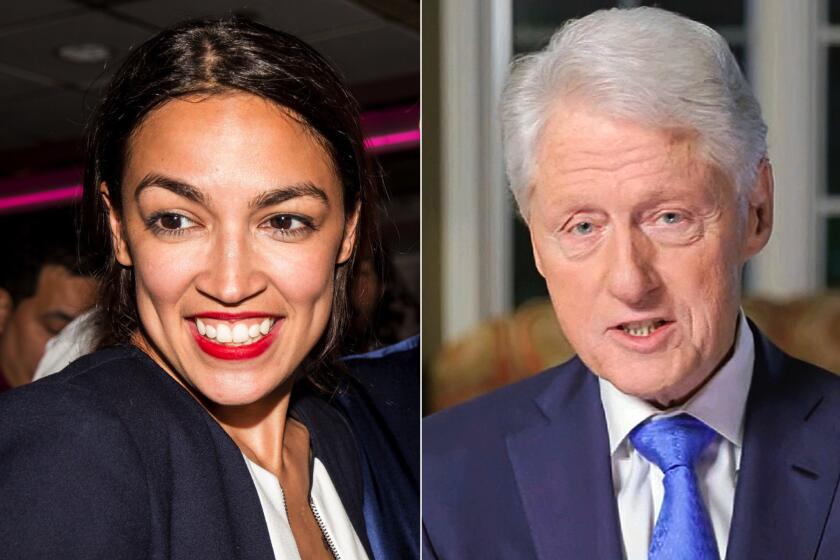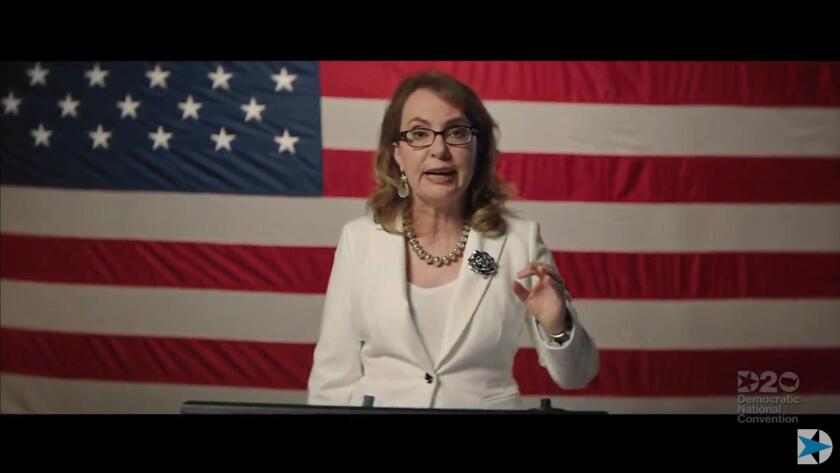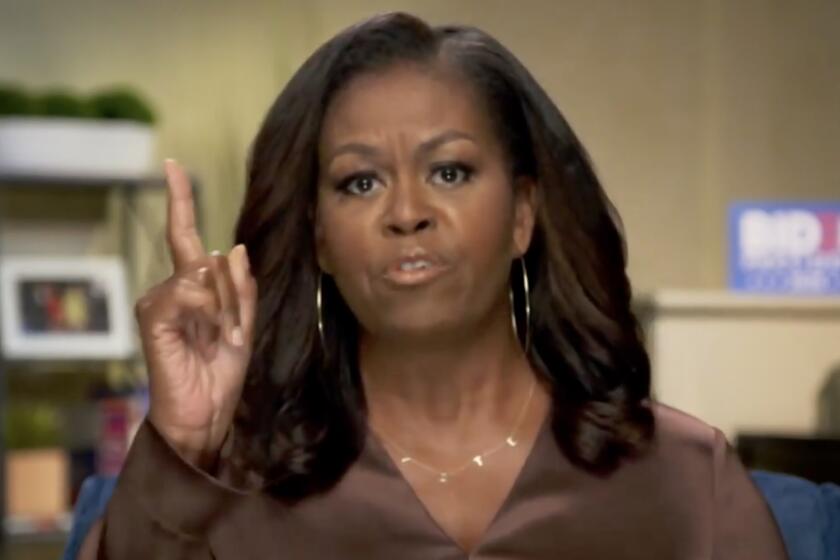5 takeaways from the third night of the DNC
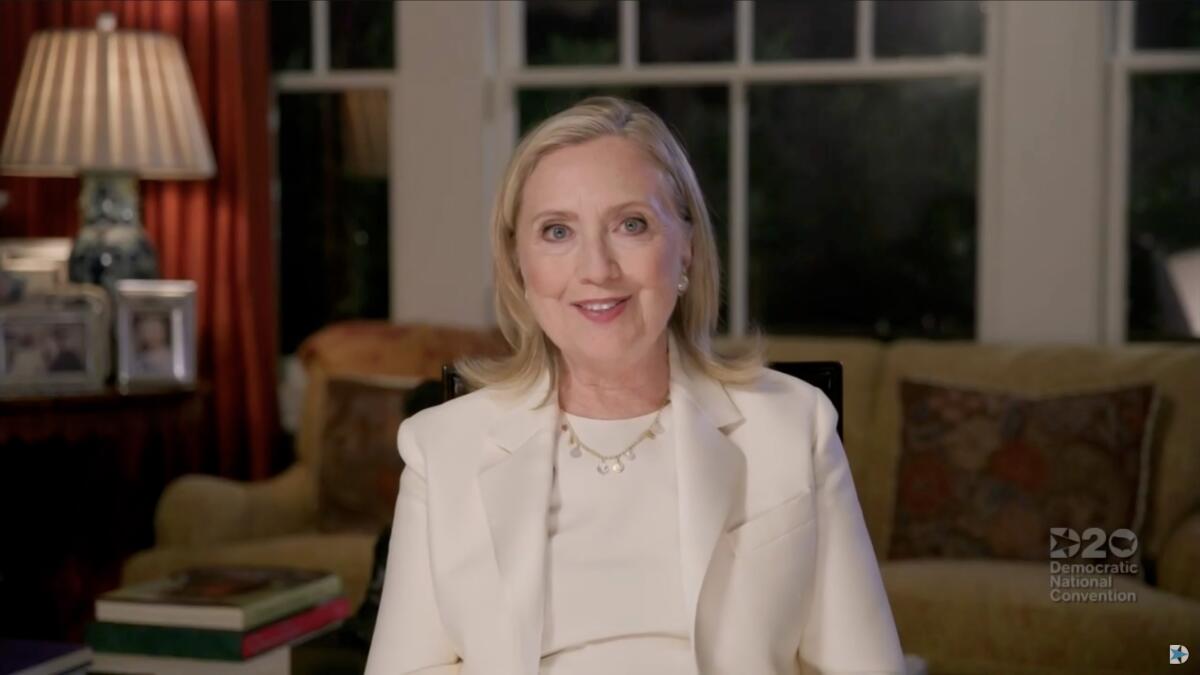
- Share via
Political conventions are always a mix of nostalgia and anticipation, and that brew was on full display on the third night of the virtual Democratic convention.
For Democrats focused on the future, there was Kamala Harris, accepting the vice presidential nomination as the first Black woman and Asian American on a major party’s ticket. Those pining for the past got the return of President Obama.
And for those still smarting about the 2016 loss, Hillary Clinton warned not to let 2020 become another “woulda, coulda, shoulda election” in which too many Democratic voters stay home.
Here’s what you need to know about the night’s programming.
Harris makes history
Harris is a rare figure in American politics — a biracial woman who has climbed to its heights. Yet in the biggest speech of her career, she emphasized that she follows in the path of groundbreaking women before her.
She began with a tribute to the women, particularly Black women, who came before her. She named civil rights icon Fannie Lou Hamer, who famously demanded a “seat at the table” at the 1964 Democratic convention, and Shirley Chisholm, the first Black woman to run for president.
Into that lineage she elevated the most important woman in her life — her late mother, an Indian immigrant who largely raised her two daughters on her own. “She probably could have never imagined that I would be standing before you now speaking these words: I accept your nomination for vice president of the United States of America,” Harris said.
Then she briefly paused, as if to soak in the moment.
- Share via
Sen. Kamala Harris accepted the vice presidential nomination at the 2020 Democratic National Convention. She is the first Black woman and the first South Asian woman ever nominated, and Democrats’ first vice presidential pick from west of the Rockies.
Obama takes on Trump
The former president said at the outset of his remarks that he would speak “plainly” about the stakes in this election. He followed with his most direct condemnation ever of President Trump’s failures and shortcomings, defying a tradition that former presidents refrain from bad-mouthing their successors.
Obama largely honored that convention after he left office, but his convention speech — set symbolically in Philadelphia, where the Constitution was debated and signed — marked an escalation. He went so far as to describe Trump as a dire threat to the nation.
Even when he turned his focus to Joe Biden, Obama defined his former vice president by implicitly contrasting Biden with Trump. When Obama spoke again of Trump, it was to accuse him of cynically trying to depress Americans’ votes to win.
“Do not let them take away your power. Do not let them take away your democracy,” he said.
- Share via
Former President Obama, who for most of the last 3 1/2 years has been restrained in criticizing his successor in the White House, delivered his most direct and scathing attack to date against President Trump at the Democratic National Convention.
Women take the lead
It was Harris’ night, but Wednesday was ladies’ night more broadly as Democrats overtly appealed to the constituency that powered their victories in 2018 and is crucial in 2020.
Convention Week dovetailed with the 100th anniversary of women’s suffrage. The spotlight on Democratic women in politics was alternately celebratory and cautionary, warning that women’s gains could be lost if Trump won reelection.
In a nod to the suffragists, Clinton wore white, as she did when she accepted the 2016 nomination, and welcomed Harris to the rarified circle with her of women on a major party’s presidential ticket. “I know something about the slings and arrows she’ll face and believe me, this former D.A. and attorney general can handle them all,” Clinton said.
- Share via
Hillary Clinton spoke Wednesday night at the Democratic National Convention.
House Speaker Nancy Pelosi, also in white, hailed the diverse Democratic caucus she leads. She assailed not just Trump, but also Senate Majority Leader Mitch McConnell — reminding viewers that Democrats are hoping to recapture the Senate along with the White House.
Sen. Elizabeth Warren refashioned her “I have a plan for that” message from her presidential campaign to promote Biden’s plan on child care — a top concern for working women and families, particularly in the age of coronavirus. “This crisis is on Donald Trump and the Republicans who enabled him. On Nov. 3 we will hold them all accountable,” she said.
The second night of the Democratic convention was supposed to highlight new talent, but most of the airtime still went to stars of yesteryear.
No longer gun-shy
Not so long ago, Democrats were terrified to talk about guns. Having lost control of Congress in 1994 after President Clinton signed into law Democrats’ bill banning assault weapons, the party for years was skittish about proposing any new restrictions on firearms.
No longer. The party’s embrace of the politics of guns — which began in earnest after the 2012 massacre of first-graders in Newtown, Conn. — was clear when gun safety was the first among several policy issues Democrats chose to feature in their prime-time broadcast.
But 2020 is not 1994. The numerous mass shootings since then have galvanized many Americans to support controls, and the chief opponent, the National Rifle Assn., has been mired in infighting and legal woes. Democrats highlighted the young activists who have mobilized after school shootings, as well as the most prominent political figure affected by gun violence: former Rep. Gabrielle Giffords of Arizona.
“Today, I struggle to speak,” said Giffords, who was shot in the head in 2011 while meeting voters. “But I have not lost my voice.”
- Share via
“Words once came easily. Today, I struggle to speak. But I have not lost my voice. America needs all of us to speak out even when you have to fight to find the words,” said former Arizona Rep. Gabrielle Giffords during the Democratic National Convention.
Courting the youths on climate change
In a video segment on climate change, the prevalence of young people attesting to Biden’s environmental bona fides was no coincidence. Climate change has emerged as a galvanizing issue for the nation’s youngest voters, as they worry about their future in a warming world.
Youth advocates are a driving force behind the sweeping proposal known as the Green New Deal, to remake the nation’s economy and lifestyle to reduce carbon emissions. Although Biden has rolled out a climate plan, he has stopped short of embracing the Green New Deal, which Trump and conservatives have attacked as radical. That phrase went unmentioned.
Still, the virtual convention featured young environmentalists who called the Biden plan “transformative.” Teen pop icon Billie Eilish urged young voters not to sit out the election: “We all have to vote like our lives and the world depend on it, because they do.”
The still-white Democratic establishment is happier making memes of Black women than actually adopting policies to better their lives.
More to Read
Get the L.A. Times Politics newsletter
Deeply reported insights into legislation, politics and policy from Sacramento, Washington and beyond. In your inbox three times per week.
You may occasionally receive promotional content from the Los Angeles Times.
